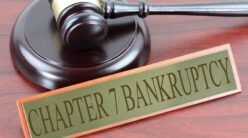 A monetary award resulting from a civil court case becomes a legal and enforceable debt. The losing party, also known as the judgment debtor, is expected either to pay up immediately or to furnish financial information that allows the judgment creditor to formulate a collection strategy. What if the judgment debtor does neither? Enter the debtor’s exam.
A monetary award resulting from a civil court case becomes a legal and enforceable debt. The losing party, also known as the judgment debtor, is expected either to pay up immediately or to furnish financial information that allows the judgment creditor to formulate a collection strategy. What if the judgment debtor does neither? Enter the debtor’s exam.
A Post-Judgment Discovery Tool
A debtor failing to pay and voluntarily disclose financial information is exactly what happens in so many cases. The judgment debtor’s financial resources are limited. Sometimes he has no intention of cooperating with the creditor, anyway. In other cases, he will cooperate but be fearful of losing his property. So he doesn’t willingly provide financial information.
A creditor can turn to the debtor’s exam, which is a post-judgment discovery tool. The exam is ordered by the court and can take place in the judge’s chambers or one of the attorney’s offices. A judge may or may not be present to rule on disputes that arise during the exam. But if not, the exam would be put on hold until a judge’s ruling could be obtained.
Answering Under Oath
The big advantage of the debtor’s exam is that the judgment debtor is required to answer questions under oath. That means any lies or misleading answers are subject to contempt of court rulings. That could mean additional financial penalties or even jail time.
As for the questions, they must all pertain to the judgment debtor’s financial resources and assets. Creditors can ask questions about:
- Employment, salary, and benefits
- Other sources of non-employment income
- Business assets and relationships
- Personal property (jewelry, collectibles, etc.)
- Real property (real estate other than a primary residence)
- Securities, investment accounts, trusts, and so on
Most states allow judgment debtors to contest questions they feel are irrelevant or unfair. Resolving a contested question would be up to a judge.
Failing to Respond to a Court Order
How the states handle debtors’ exams differs according to their individual rules. In some states, debtors’ exams occur immediately following the court’s decision in a civil trial. In other cases, the exams are scheduled for a later date. Some states actually subpoena judgment debtors to ensure they appear in court on the appointed date
What if a judgment debtor fails to show? A bench warrant can be issued for the debtor’s arrest. Once apprehended, the debtor is forcibly compelled to appear in court to answer questions under oath.
Why It All Matters
By now you might wonder why all this matters. To the creditor, it is all about formulating a collection strategy. Imagine a creditor planning to assign his money judgment to a collection agency like Salt Lake City, Utah’s Judgment Collectors. Before Judgment Collectors can decide whether to take the case, they need to know the scope of the income assets they are looking at.
A judgment debtor’s income and assets determine which collection strategies are most appropriate. For example, attempting to obtain writs of execution against a debtor with no high-value, non-exempt assets would be a waste of time. Likewise, attempting to garnish a self-employed contractor’s wages would be ineffective. A self-employed contractor does not receive a weekly paycheck like a traditional employee.
Judgment creditors need to understand the income and assets they are dealing with in order to determine how to proceed with collection. When judgment debtors do not voluntarily provide the information, creditors may have no other choice than requesting the debtor’s exam. If it takes answers under oath to get the information, so be it.


